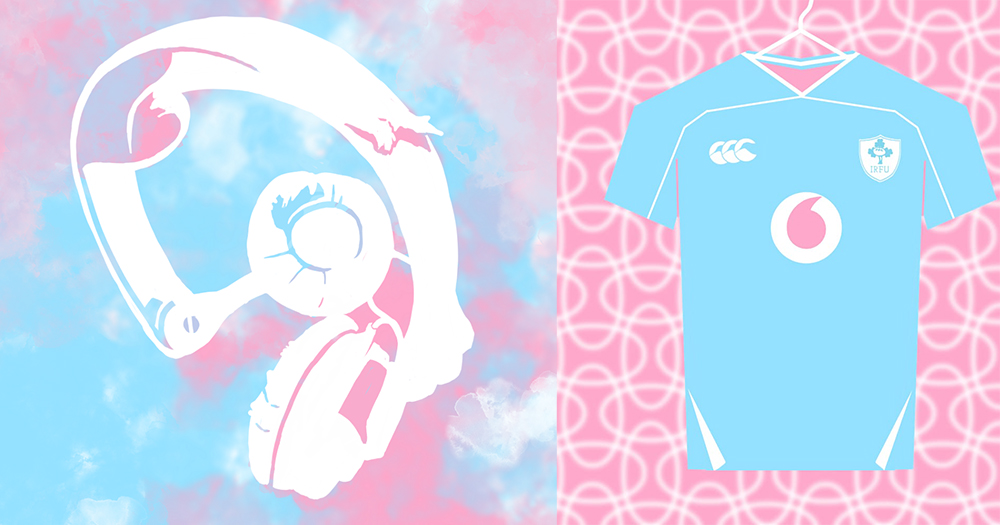In their podcast series, ConverSayTrans, the Stairlings Collective explore trans culture and history, speaking to some incredible guests and diving into amazing archival material along the way.
Made with funding from Create and in collaboration with TENI, the series creators recognise the need for intergenerational dialogue and community care for trans people and hope that ConverSayTrans helps to be part of that. Here, Alisha Doody, Jules Farrell, Lilith Ferreyra-Carroll and Alexandra Hall share the podcast’s journey.
What was the inspiration for making ConverSayTrans?
The inspiration for making a podcast or about recording conversations between trans people came from Lilith Ferrerya-Carroll. The Stairlings Collective were having conversations with Lilith about the potential next projects we would like to work on. In our previous projects we had involved elements of conversations – sharing histories, recording stories and that kind of thing. So when Lilith mentioned her idea for a podcast that would see trans people in dialogue with other trans people, Alexandra and Jules thought it was a great idea.
Alisha – the artist involved in the collective was also really interested in researching the idea that intergenerational dialogue, or rather, younger members of the LGBTQI+ community speaking with older members was a really important part of the process of developing our identities. So it kind of snowballed from there.

You mention in the description that you want to explore invisible histories and culture, could you elaborate on that?
The idea of invisible histories and culture is one that we have been interested in since we first formed in 2018 … Initially we started out to explore LGBTQI+ history but realised pretty quickly that it is really difficult to do that. We can all recognise that whether it is because materials are stored in an archive and become more difficult to access, or that you just don’t know anyone older than you to tell you about those things it can be difficult to learn about what happened within the community in the past. We realised pretty quickly that we were going to have to start asking people directly to tell us their stories and what they remembered.
Once we started to do that we also became keenly aware that we wanted to start sharing some of this research in a creative way with others. So our first project started out small and looked at shared experiences of oppression across generations – we created a collaboratively written speech with older members of the community and performed it to a select audience (this wasn’t long after Panti Bliss’ Noble Call – so she deserves recognition for inspiring us to do that). After that, we ran workshops in Dublin Castle in the Museum of Contemporary Photography as part of the PhotoIreland Festival.

We invited some older LGBTQI+ activists to join us in conversation and talk about media representation in the past. And the lovely crew in GCN donated a load of magazines for us to use in our collage and badge-making workshops the same day, so we were able to make the workshops interactive. We wanted conversations to take place informally while people who attended made artworks based on what they had learned. After that we did the EveryWoman Project and that was about trans women and non-binary femme folk. But, in some ways stepped away from what we had previously been doing.
After the success of that project we decided to look at ways of exploring trans history and culture using some of the methods from our earlier projects – primarily conversation and dialogue. Actually, Lilith used a really good term when we were discussing all of this, she talked about the lack of generational continuity in the trans community. And I think that really sums up why it’s important to explore and share history and culture through the podcast.

In the ConverSayTrans episodes you’ve already made, where there any particular conversations and moments that stood out for you?
Lilith: My favourite moments, aside from the entire podcast with Eilís, has been generally when trans people end up talking in a way that’s supporting each other or when they talk about what they do that helps others in the community or give little nuggets of wisdom. Like when Sara talked about navigating identity and family, when Casey talked about transition being like a train journey, Delroy talking about his writings back in the day and his influence on raising awareness in Africa through his Facebook. I think they’re the little moments of magic that set the podcast apart.
Jules: The moments that stood out for me happen in quite a few conversations we have. It is a moment of remembrance of one’s past…
For instance we had a lovely and funny conversation with Dublin comedian, Alannah, and she told us about how she use to be a kayak top competitor in the world, just bobbing through those rapids. These moments of great exhilaration on the water were times were she didn’t have to think of her gender identity and could just exist. Obviously it wasn’t sustainable for the life she wanted to live, presenting as male. But it just shows the vast array of experiences that trans people can have.
Alisha: I think for me, I’m enjoying watching Alexandra and Jules grow and become more confident. We’ve worked together for almost the last three years but I see the most change in them in this project. They have taken real ownership over it and their personalities are coming through so much. Of course, there’s loads of individual moments but I think that would it be for me.
Alexandra: My favourite moment is either the talk at the end of Delroy’s episode or when I started singing the Vore song.

What are the plans for upcoming ConverSayTrans episodes, do you have any interviewees lined up?
We have a few people lined up but we don’t want to jinx anything by telling you who they are. You will just have to follow us (Twitter, Instagram, Spotify) to find out!
The Stairlings Collective shared also the incredible support given to them by Tortoise Shack – a podcast hub that supports independent podcasts, and Tony Groves who gave invaluable advice and support and continues to do so. Jordan Hearnes has been involved in sound production so a thanks to them too!
© 2021 GCN (Gay Community News). All rights reserved.
Support GCN
GCN is a free, vital resource for Ireland’s LGBTQ+ community since 1988.
GCN is a trading name of National LGBT Federation CLG, a registered charity - Charity Number: 20034580.
GCN relies on the generous support of the community and allies to sustain the crucial work that we do. Producing GCN is costly, and, in an industry which has been hugely impacted by rising costs, we need your support to help sustain and grow this vital resource.
Supporting GCN for as little as €1.99 per month will help us continue our work as Ireland’s free, independent LGBTQ+ media.

comments. Please sign in to comment.